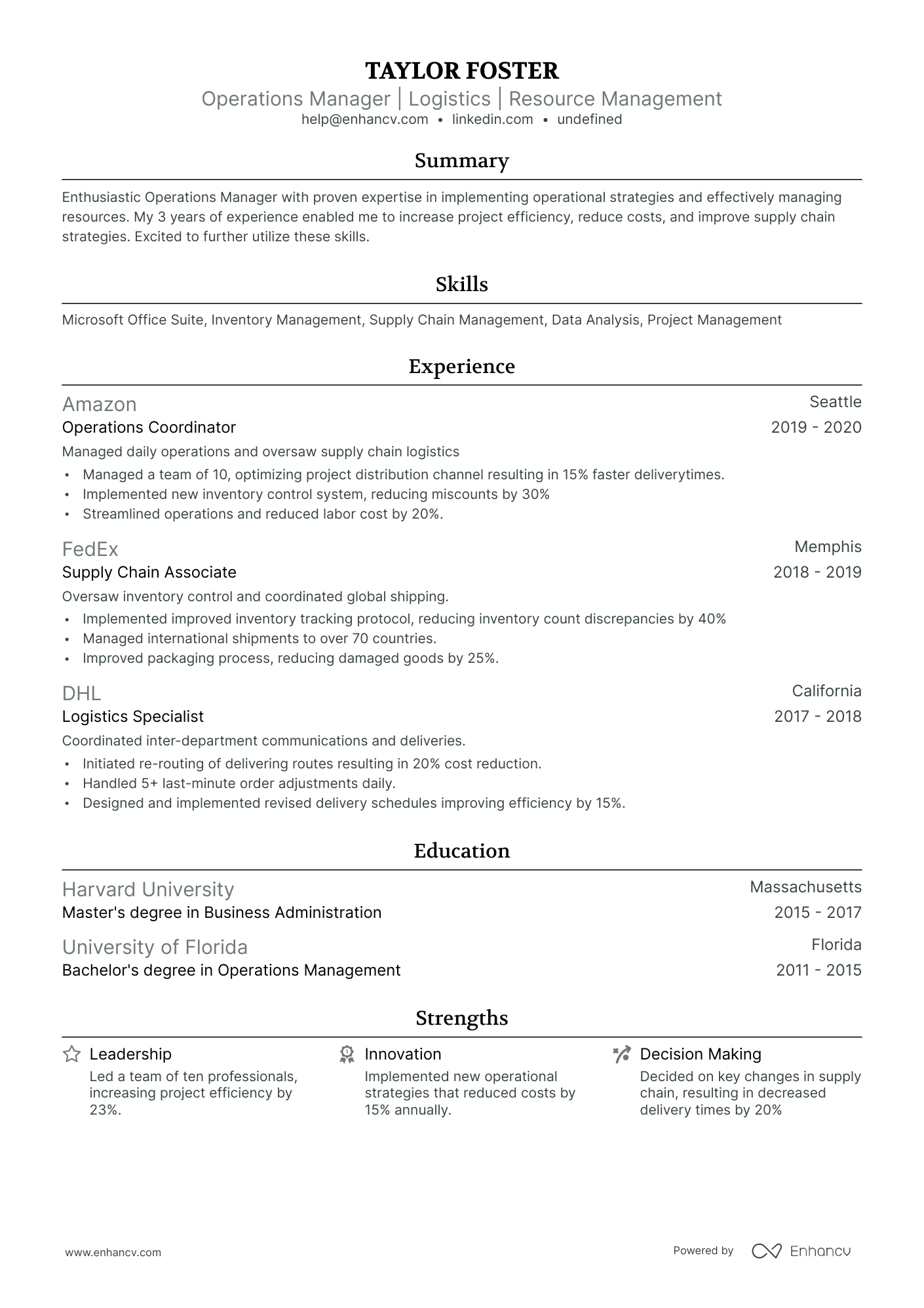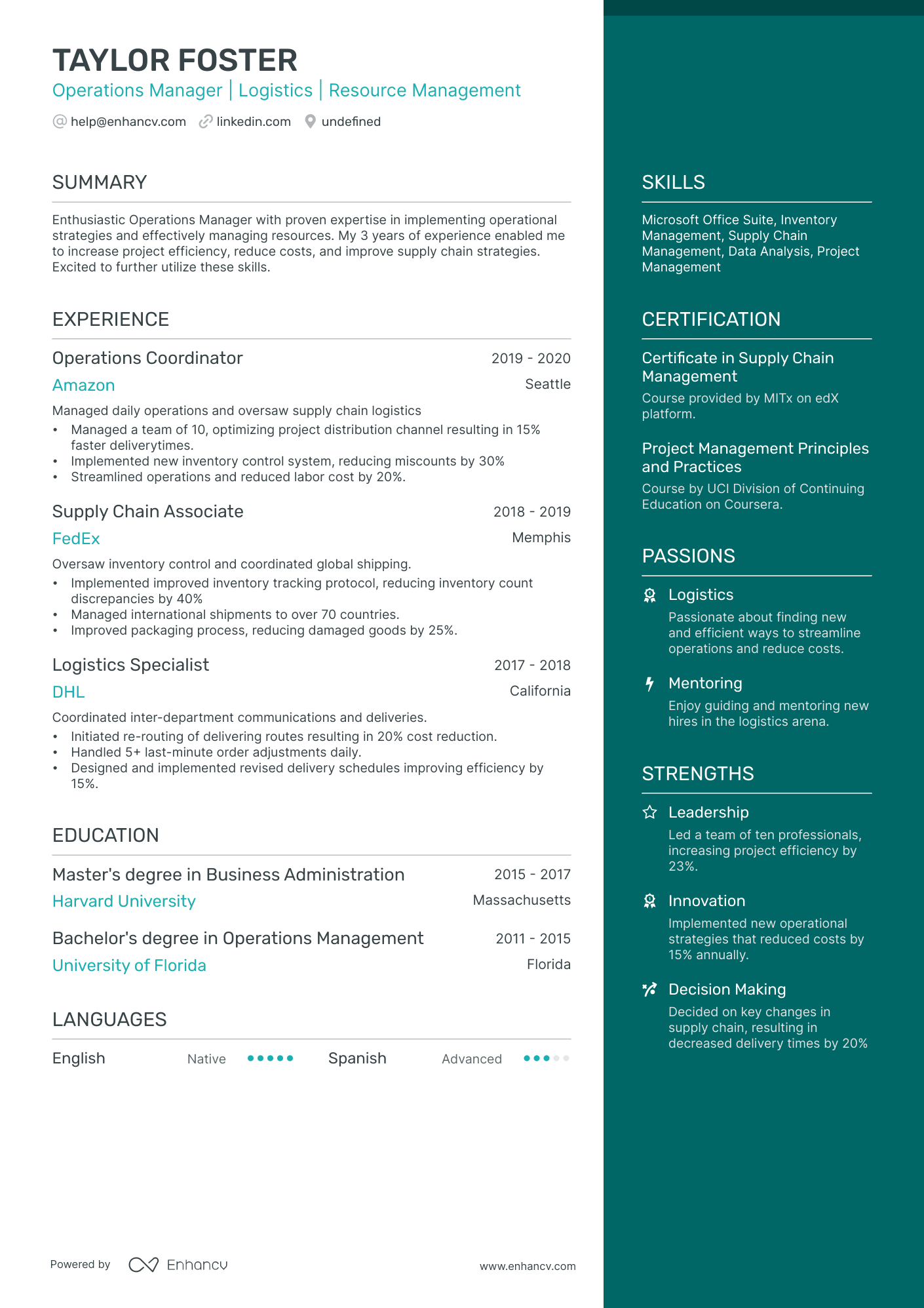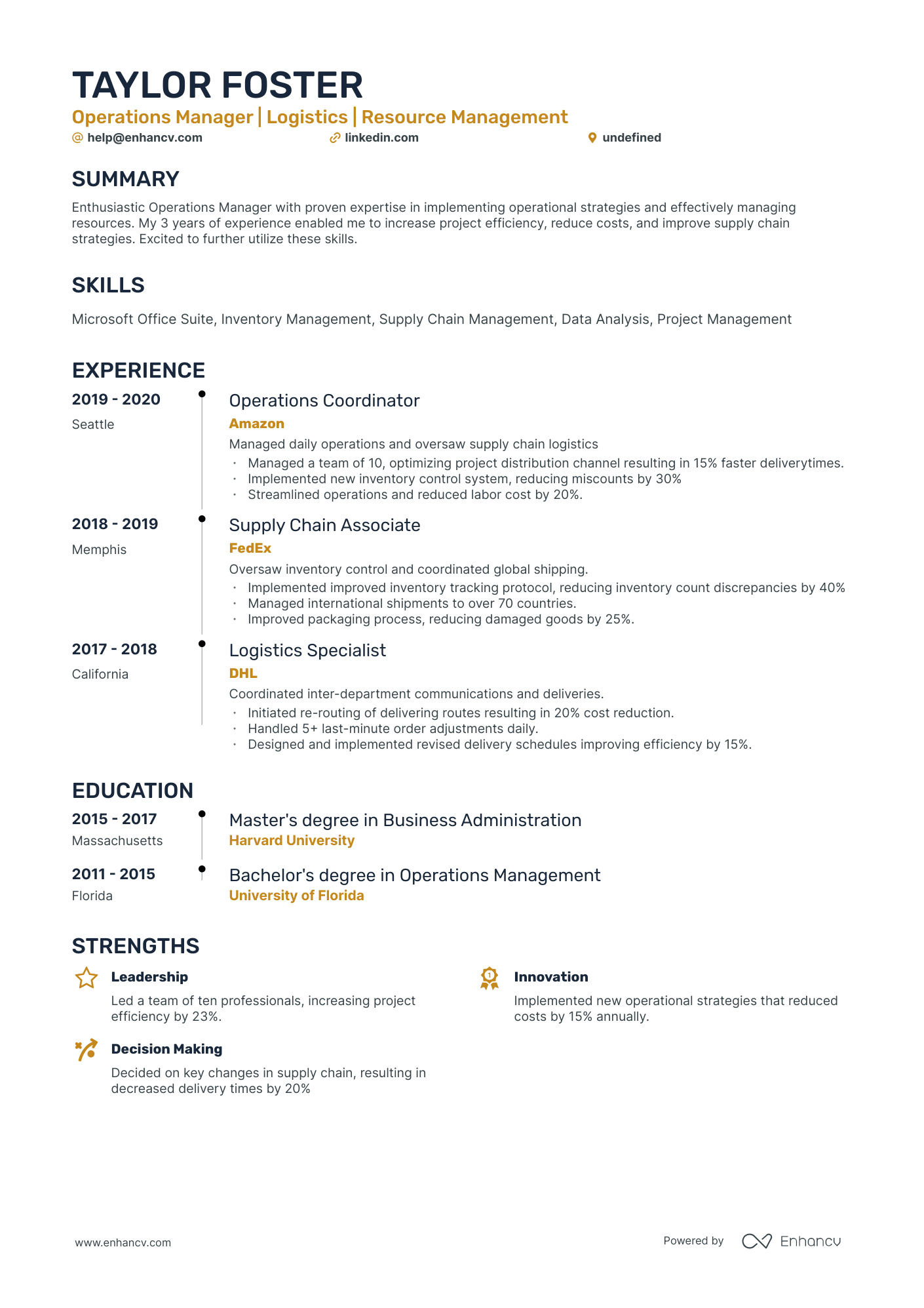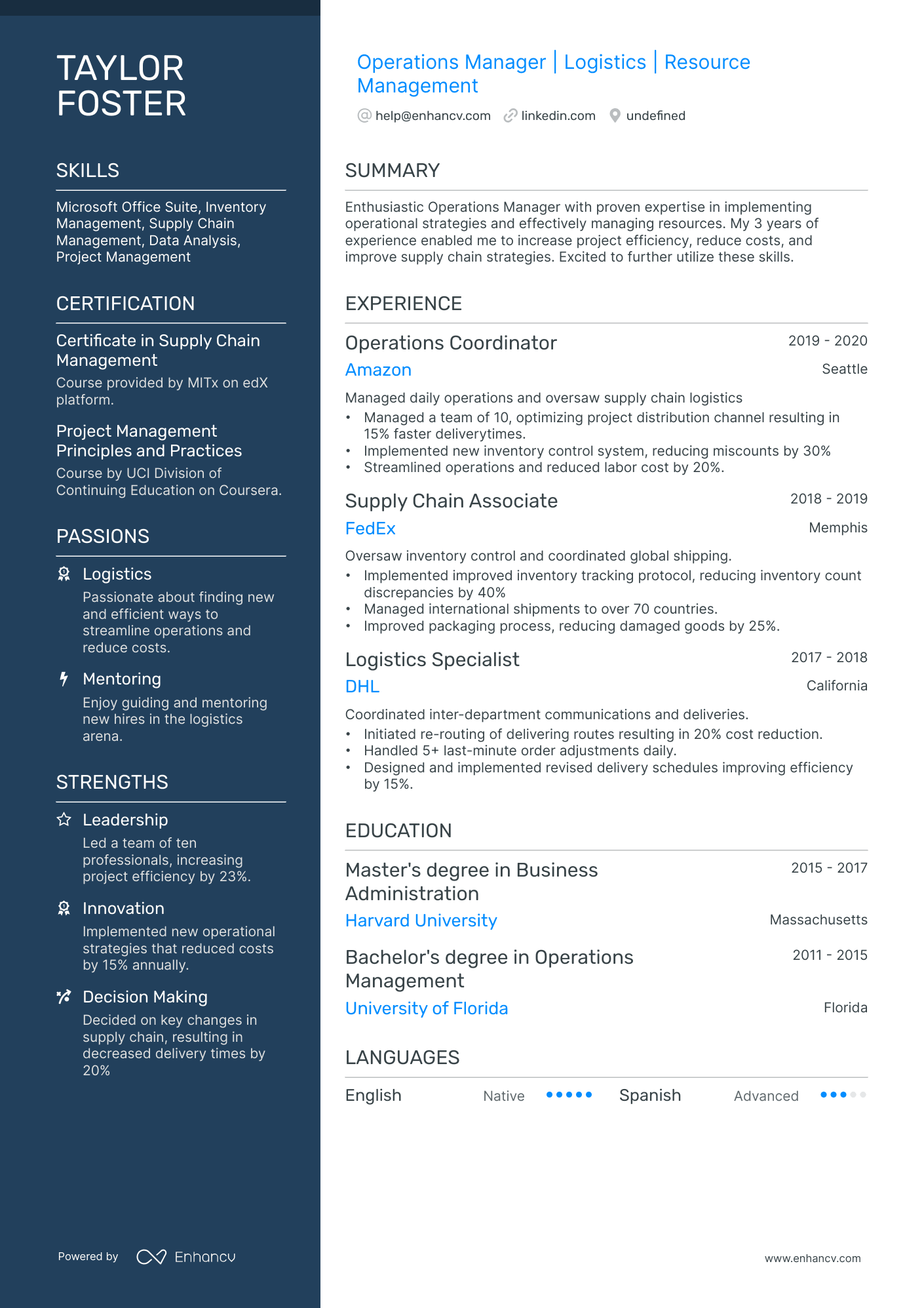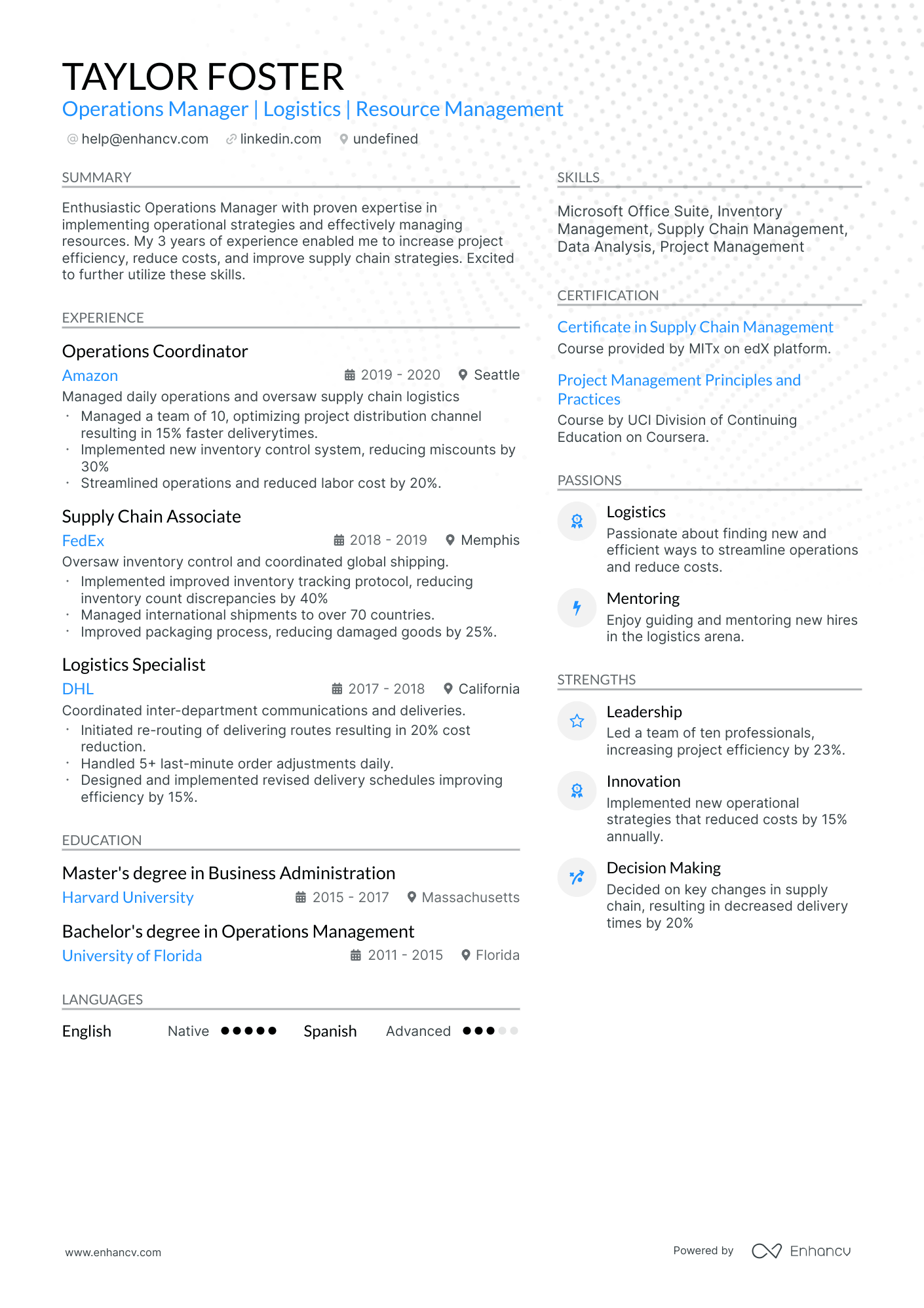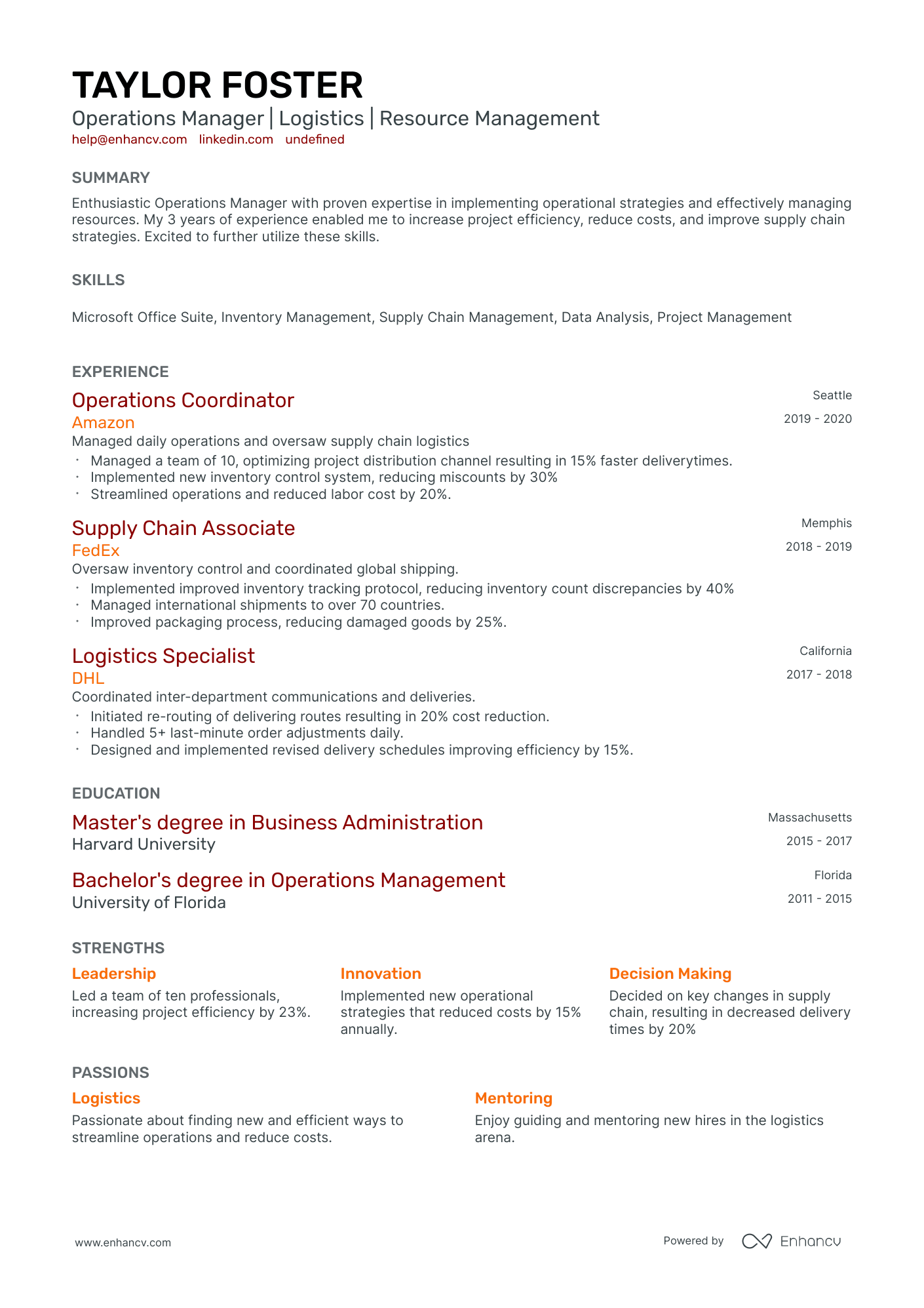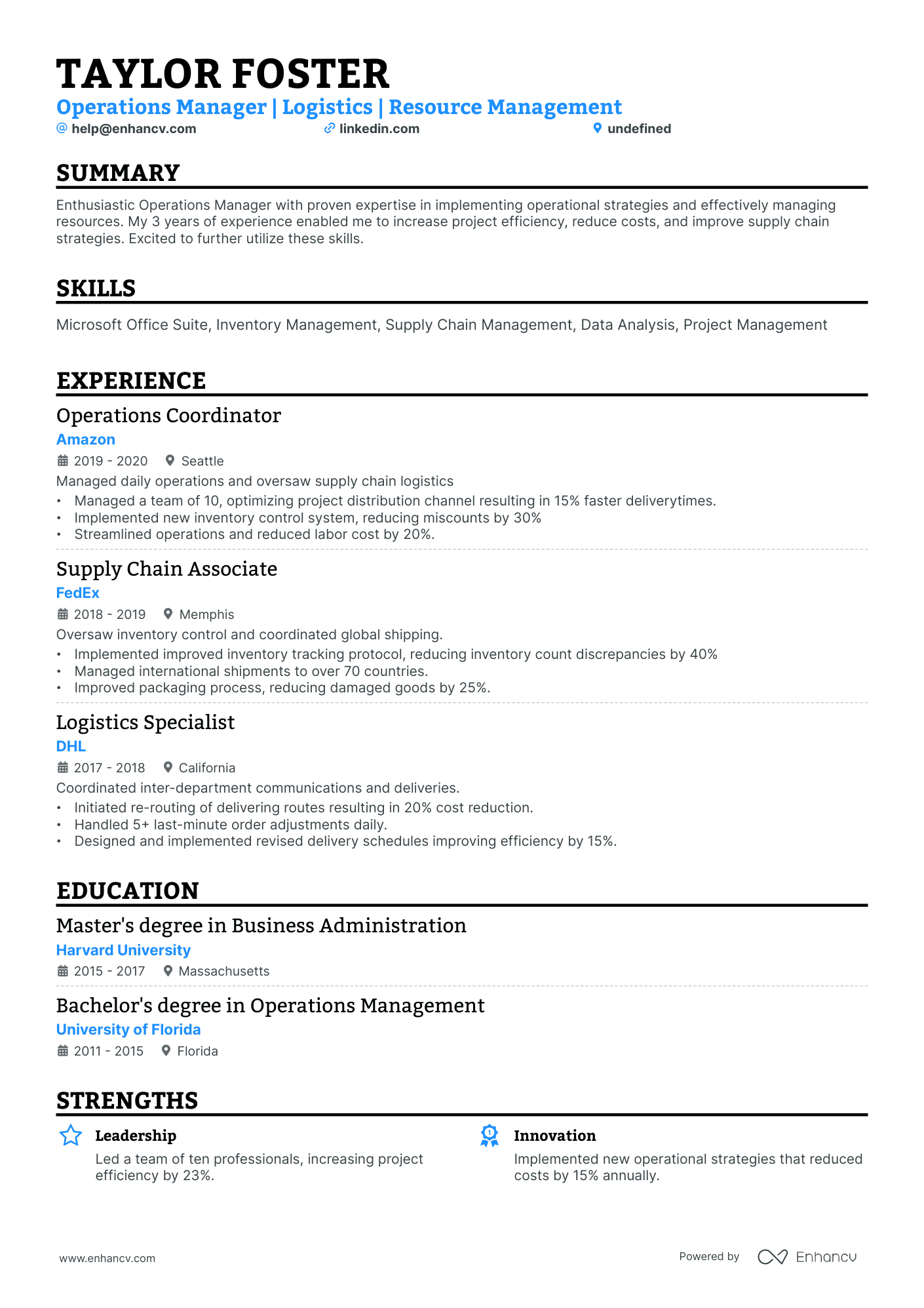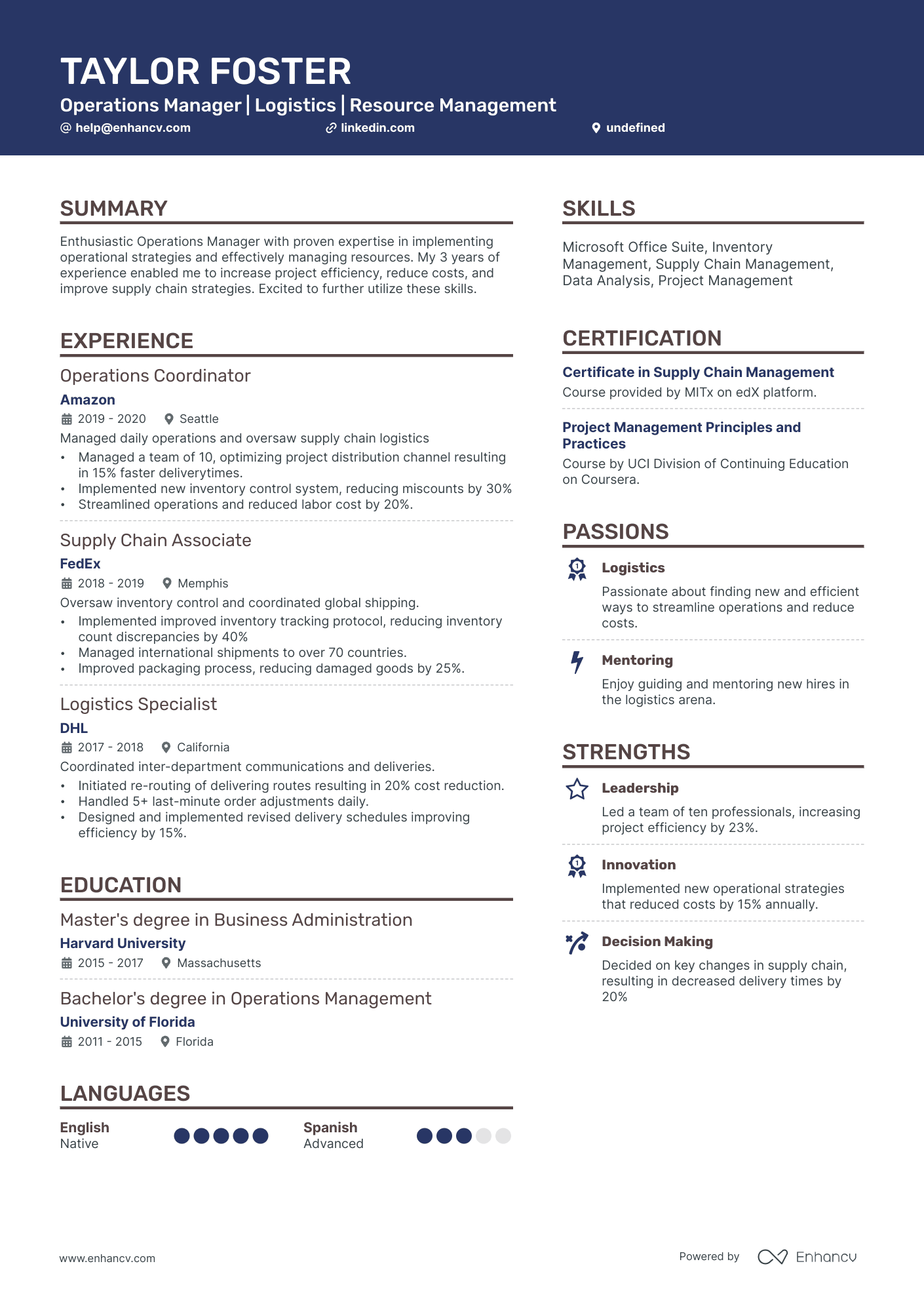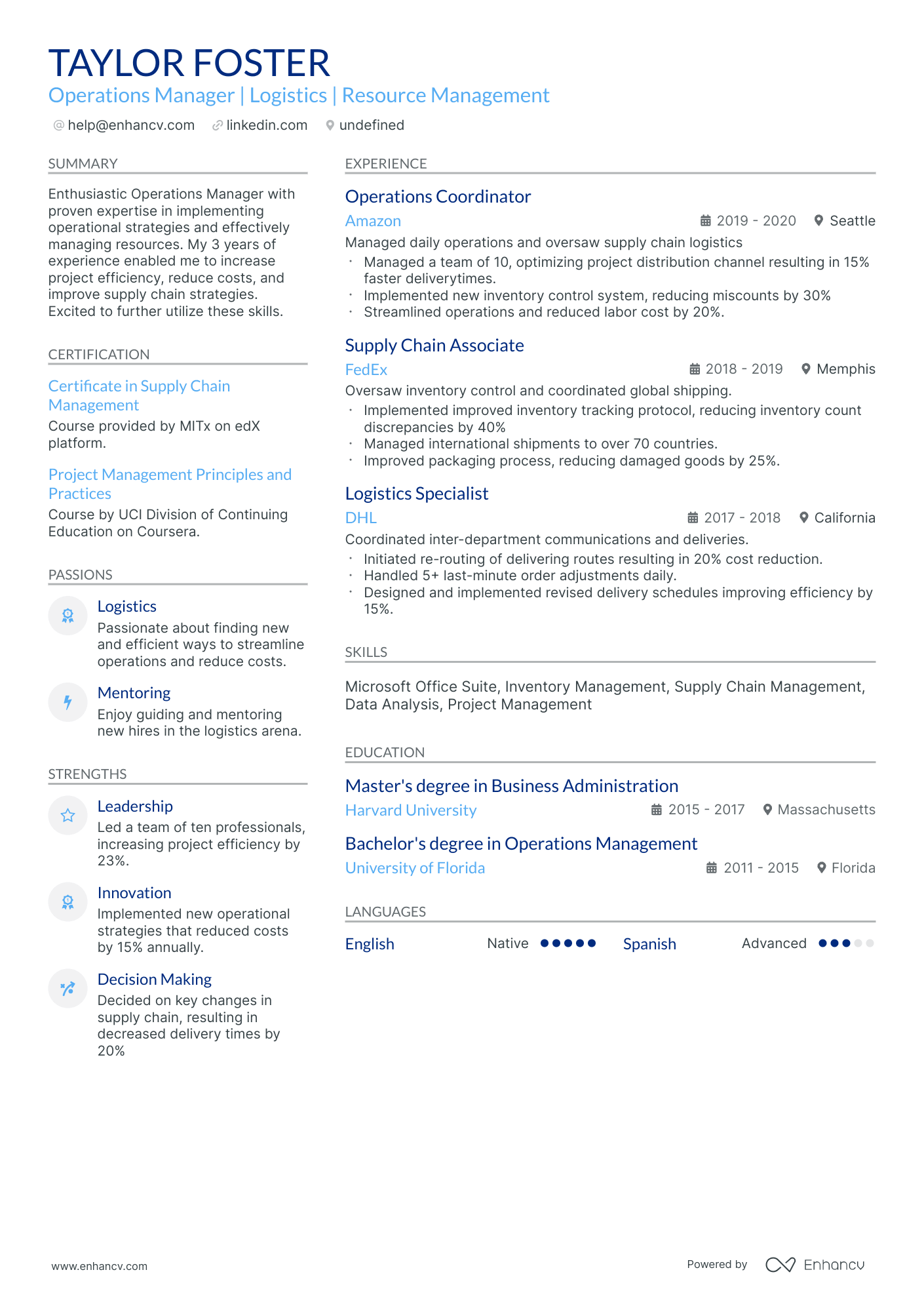Entry-level operations managers often struggle with showcasing their leadership and management skills in the absence of extensive professional experience. Our guide provides practical strategies to highlight relevant academic projects, internships, or transferable skills from other roles that underline your potential for operations management.
Dive into this guide to uncover:
- Top-tier entry-level operations manager resume samples that have successfully landed candidates in leading companies.
- Strategies to direct recruiters' focus towards your standout experiences, notable achievements, and pivotal skills.
- Guidance on crafting resume sections that align closely with the vast majority of job specifications.
- Insights on harmonizing your entry-level operations manager technical prowess with your distinct personality, setting you apart from the competition.
Recommended reads:
Designing your entry-level operations manager resume: best practices
Before penning down your entry-level operations manager resume, consider its structure and format. Here's what you should remember:
- Employ the reverse-chronological format to present your experience, starting with your most recent role.
- Your resume's header should feature accurate, professional contact details. If you maintain a professional portfolio or LinkedIn profile, include its link.
- Keep your resume concise, ideally within two pages. Prioritize relevance over length.
- Unless directed otherwise, save your resume as a PDF to preserve its design.
Upload your resume
Drop your resume here or choose a file. PDF & DOCX only. Max 2MB file size.
Pro tip
Choose a functional resume template that offers ample space to showcase your unique entry-level operations manager expertise.
The five (plus) definite sections your resume for a office administrator job should include are:
- Header with your headline, contact details, and/or a preview of your work
- Summary (or objective) to pinpoint how your success aligns with the role
- Experience with bullets of your most relevant achievements in the field
- Skills to integrate vital job requirements (both technical and personal)
- Your further dedication to the field, showcased via relevant higher education and/or certifications
What recruiters want to see on your resume:
- Leadership Experience: Even for entry-level roles, experience leading teams or projects can stand out as evidence of management potential.
- Operational Knowledge: Understanding of operational processes and systems, even if from an internship or academic project, can show readiness for this role.
- Analytical Skills: The capacity to analyze operational data for process improvement is highly valued. This could be demonstrated through coursework or previous jobs.
- Communication Skills: Excellent written and oral communication skills are a must, given the collaborative nature of operations management.
- Problem-Solving Ability: Demonstrated ability in solving problems efficiently, ideally in a business setting, will be prioritized given the unpredictable nature of operations management.
Recommended reads:
Decoding the entry-level operations manager resume experience section
Once you've settled on your resume's format, the next step is detailing your professional journey.
Many entry-level operations manager professionals grapple with this section, especially when balancing between extensive or limited experience. Here's a roadmap to navigate this:
- Limit bullet points under each job role to six, focusing on high-impact contributions.
- Highlight achievements that resonate with the job's requirements, rather than just listing duties.
- Detail any on-the-job certifications or skills acquired and their relevance to your growth.
- Choose impactful verbs for each bullet, avoiding overused terms like "managed".
- Infuse relevant keywords from the job posting, especially in the context of accomplishments.
For more insights, explore these curated examples from seasoned entry-level operations manager professionals:
- Managed daily operations, including inventory control and supply chain coordination, resulting in a 20% reduction in stock shortages.
- Implemented process improvements that led to a 15% increase in productivity within the operations department.
- Collaborated with cross-functional teams to streamline workflows and reduce turnaround time by 25%.
- Developed and implemented training programs for new hires, resulting in a 30% decrease in onboarding time.
- Monitored key performance indicators (KPIs) and utilized data analysis to identify areas for improvement.
- Oversaw production schedules and ensured timely delivery of products, meeting customer expectations.
- Implemented cost-saving measures, resulting in a 10% reduction in operational expenses.
- Led a team of 15 employees and provided regular coaching and feedback to improve performance.
- Developed and executed strategies to optimize warehouse layout, increasing storage capacity by 30%.
- Coordinated with vendors to negotiate favorable contracts and reduce procurement costs by 15%.
- Managed end-to-end logistics operations, including transportation, warehousing, and distribution.
- Implemented a real-time tracking system, resulting in a 20% reduction in shipment delays.
- Collaborated with suppliers to establish quality control processes, leading to a 15% decrease in product defects.
- Developed and executed lean management initiatives, increasing operational efficiency by 25%.
- Led a team of 25 employees, fostering a positive work environment and achieving high employee satisfaction.
- Coordinated production schedules and optimized resource allocation, resulting in a 10% increase in output.
- Implemented safety protocols and conducted regular training sessions, reducing workplace accidents by 30%.
- Developed and implemented quality assurance procedures, improving product reliability by 20%.
- Collaborated with engineering teams to develop and launch new products, contributing to a 15% revenue growth.
- Analyzed market trends and customer feedback to identify opportunities for product portfolio expansion.
- Managed cross-functional teams to execute complex projects on time and within budget.
- Optimized inventory management processes, resulting in a 15% reduction in stock holding costs.
- Implemented data-driven decision-making strategies, leading to a 20% improvement in operational efficiency.
- Developed and implemented quality control measures, reducing defects by 25%.
- Led process reengineering initiatives, resulting in a 30% reduction in overall operational expenses.
- Managed daily warehouse operations, ensuring accurate order fulfillment and on-time shipments.
- Implemented a barcode scanning system, reducing picking errors by 20% and improving inventory accuracy.
- Optimized layout and storage capacity, resulting in a 15% increase in warehouse efficiency.
- Led a team of 20 employees, providing training and coaching to improve productivity and performance.
- Collaborated with suppliers to negotiate favorable terms, achieving cost savings of 10%.
- Developed and implemented standard operating procedures (SOPs) to streamline workflows and improve operational efficiency.
- Utilized data analysis to identify bottlenecks and implement process improvements, resulting in a 20% increase in productivity.
- Led cross-functional teams in executing strategic initiatives, including cost reduction and quality optimization projects.
- Implemented a performance management system, resulting in a 25% improvement in employee engagement and performance.
- Collaborated with senior management to develop and execute the annual budget, achieving cost savings of 15%.
- Manage day-to-day operations, ensuring smooth functioning of all departments.
- Oversee procurement activities, negotiating contracts and reducing costs by 10%.
- Implement continuous improvement initiatives, resulting in a 15% increase in overall operational efficiency.
- Lead and mentor a team of 30 employees, promoting professional growth and achieving departmental targets.
- Collaborate with senior management to develop strategic plans and execute organizational goals.
- Directed daily operations, ensuring compliance with company policies and industry regulations.
- Implemented a quality management system, resulting in a 20% reduction in product non-conformities.
- Led process improvement initiatives, resulting in a 15% increase in operational efficiency and cost savings.
- Managed key vendor relationships and negotiated contracts, achieving cost reductions of 10%.
- Developed and implemented employee training programs, improving team performance and morale.
- Managed end-to-end supply chain operations, including procurement, inventory management, and distribution.
- Implemented demand forecasting models, resulting in a 25% reduction in stockouts and excess inventory.
- Led cross-functional teams in implementing lean manufacturing processes, increasing overall efficiency by 20%.
- Collaborated with suppliers to optimize lead times, resulting in a 15% improvement in order fulfillment.
- Developed and executed cost-saving initiatives, leading to a 30% reduction in logistics expenses.
Quantifying impact on your resume
<ul>
Crafting the experience section for novice entry-level operations manager candidates
Lack of extensive experience doesn't equate to an empty resume. Here's how you can enrich your experience section:
- Volunteer Roles: Community involvement often equips you with valuable interpersonal skills, and sometimes even technical ones, relevant to the job.
- Academic Projects: Highlight significant university projects that contributed to the field, showcasing your hands-on experience.
- Internships: Even short-term internships can be invaluable. If they're pertinent to the role, they deserve a spot on your resume.
- Past Jobs: Even if unrelated to the entry-level operations manager, these roles can demonstrate transferable skills that are beneficial for the position.
Recommended reads:
Pro tip
The wording of your experience items should be with active, power verbs, instead of adjectives. Always be specific about each item you detail, and never overuse vague buzzwords. You weren't just "organized", but rather "Enhanced internal work processes to optimize operational management by 65%".
creating your entry-level operations manager resume skills section: balancing hard skills and soft skills
Recruiters hiring for entry-level operations manager roles are always keen on hiring candidates with relevant technical and people talents.
Hard skills or technical ones are quite beneficial for the industry - as they refer to your competency with particular software and technologies.
Meanwhile, your soft (or people) skills are quite crucial to yours and the company's professional growth as they detail how you'd cooperate and interact in your potential environment.
Here's how to describe your hard and soft skill set in your entry-level operations manager resume:
- Consider what the key job requirements are and list those towards the top of your skills section.
- Think of individual, specific skills that help you stand out amongst competitors, and detail how they've helped you succeed in the past.
- Look to the future of the industry and list all software/ technologies which are forward-facing.
- Create a separate, technical skills section to supplement your experience and further align with the entry-level operations manager job advert.
Find the perfect balance between your resume hard and soft skills with our two lists.
Top skills for your entry-level operations manager resume:
Microsoft Excel
Project Management Software (e.g., Asana, Trello)
Data Analysis Tools (e.g., SQL, Tableau)
Inventory Management Systems
Customer Relationship Management (CRM) Software
Supply Chain Management Software
Basic Financial Reporting Tools
Process Improvement Methodologies (e.g., Lean, Six Sigma)
Scheduling Software
Basic Accounting Software
Communication
Problem-Solving
Time Management
Team Collaboration
Adaptability
Attention to Detail
Critical Thinking
Leadership Potential
Interpersonal Skills
Organizational Skills
Pro tip
Sometimes, basic skills mentioned in the job ad can be important. Include them in your resume, but don't give them too much space.
Optimizing the education and certification sections of your entry-level operations manager resume
Your education and certification sections can be game-changers on your entry-level operations manager resume, showcasing your commitment to professional growth.
For the education section:
- Highlight advanced education, noting the institution and duration.
- If you're currently studying, mention your expected graduation date.
- Exclude degrees that don't align with the job's requirements.
- If relevant, delve into your academic journey, spotlighting significant achievements.
When listing degrees and certifications:
- Feature those directly relevant to the role.
- Highlight recent and significant knowledge or certifications at the top of your resume.
- Provide essential details like the issuing institution and dates for credibility.
- Avoid listing irrelevant degrees or certifications, such as your high school diploma or unrelated specializations.
Remember, even if you're tempted to omit your education or certifications, they can offer a competitive edge, signaling a long-term commitment to the industry.
Best certifications to list on your resume
Pro tip
Listing your relevant degrees or certificates on your entry-level operations manager resume is a win-win situation. Not only does it hint at your technical capabilities in the industry, but also at a range of soft skills, including perseverance, adaptability, and motivation.
Recommended reads:
best practices for your entry-level operations manager resume summary or objective
How do you know if you should include a resume summary or a resume objective?
- Resume summaries are ideal for entry-level operations manager professionals with more experience, who'd like to give a quick glimpse of their biggest career achievements in the top one-third of their resumes.
- On the other hand, resume objectives serve as a road map to the applicant's aspirations. Candidates use the objective as the North Star of their career (or, how they see themselves in the role in the next few years).
Both could be the perfect fit for your entry-level operations manager resume, depending on your experience.
Here's how candidates for the entry-level operations manager job structure their summaries and objectives.
Resume summary and objective examples for a entry-level operations manager resume
Optimize your resume summary and objective for ATS
Drop your resume here or choose a file.
PDF & DOCX only. Max 2MB file size.
Additional sections to elevate your entry-level operations manager resume
Recruiters often seek candidates who offer more than just the basics.
To stand out, consider adding:
- Interests: Share hobbies or activities that reveal your personality and transferable skills.
- Projects: Highlight innovative work that showcases your expertise.
- Languages: If communication is vital for the role, showcase your linguistic abilities.
- Awards: Feature significant recognitions that underscore your expertise.
Key takeaways
- Craft a entry-level operations manager resume that's easy to read and aligns with the role's requirements.
- The top third of your resume should clearly convey your unique value proposition for the entry-level operations manager role.
- Tailor your resume to the job, highlighting skills, achievements, and the tangible results of your efforts.
- Detail your certifications and technical skills to demonstrate proficiency with specific tools and technologies.
- The sections you choose should collectively present a comprehensive view of your professional expertise and personality.
